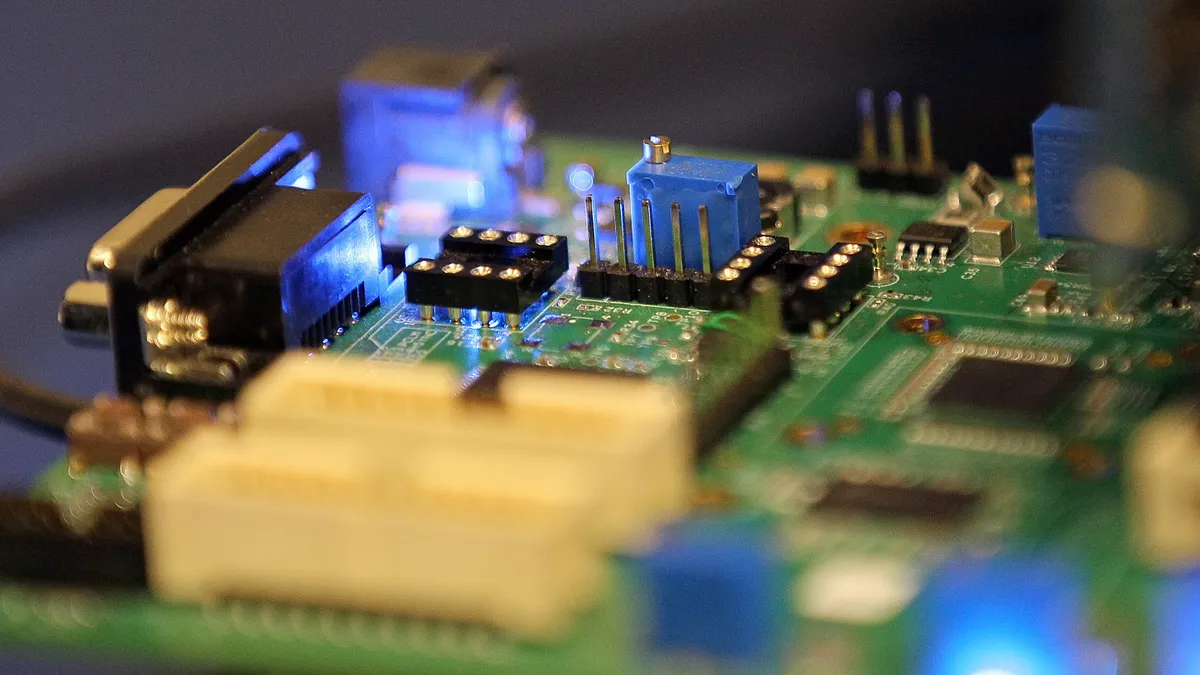As semiconductor demand rises for 5G, autos and appliances and immediate relief from shortages appears unlikely, chip makers and their customers are tapping into new strategies to bolster capacity.
Intel, Taiwan Semiconductor Manufacturing Company, Texas Instruments, NXP Semiconductors, Advanced Micro Devices, United Microelectronics and Stanley Black & Decker all found ways to build up capacity in Q4 2021. During earnings calls, company executives told investors they are deepening relationships and signing long-term agreements to lock in business and provide visibility and stable capacity assurance.
Semiconductor demand surged by 17% in the past two years, according to the U.S. Department of Commerce, as companies increasingly placed them in everything from autos to appliances. Buyers' median semiconductor product inventory has fallen to less than 5 days’ worth from 40 days in 2019, with inventories even lower in key industries.
Semiconductor manufacturers are spending billions of dollars to catch up on long order backlogs.
- Intel announced a plan to spend up to $100 billion to build potentially the world's largest chip-making complex in Ohio. Production is expected to begin in 2025, according to a news release.
- TSMC is planning to open factories in Arizona and Taiwan.
- Texas Instruments will add incremental production capacity for the next two quarters before new facilities come online in Q3 2022 and Q1 2023, CFO Rafael Lizardi told investors last week.
- Advanced Micro Devices spent $1 billion in 2021 to expand its long-term capacity, CFO Devinder Kumar told investors on the Q4 call.
- NXP Semiconductors has $4 billion in capital expansion plans, which are backed by non-cancelable, non-returnable orders, according to Bill Betz, the company's CFO.
- United Microelectronics expects to increase its production capacity by 6% in 2022, President Jason Wang told investors in a Q4 earnings call.
More capacity may provide eventual relief to a variety of industries. But the past two years have emphasized "the need for structural and dramatic transformation in the foundry value chain toward closer cooperation and mutual risk mitigation," Wang said.
United Microelectronics has signed customers to "accelerated capacity expansion partnerships" that provide loading protection, Wang said. The company is also improving supply chain visibility to help address undersupply.
A similarly tight supply of chips and other parts prompted Stanley Black & Decker to add new tier 2 and tier 3 chip suppliers, co-investing with the company's tier 1 suppliers to improve capacity and lower lead times across the supply base.
Based on commitments from its semiconductor suppliers, the company expects "a 20% to 30% increase in chips in Q2 versus the current run rate," said Don Allan, president and CFO of Stanley Black & Decker, during an earnings call Tuesday.
Intel and Advanced Micro Devices also highlighted improved relationships with suppliers during their Q4 earnings calls.
Advanced Micro Devices is working much more closely with customers and suppliers, offering visibility "multiple quarters and, in some cases, multiple years out," CEO Lisa Su said on an earnings call. "For the type of capacity that we're talking about, for the size of the customers that we're talking to, we need to do that."
Intel's agreements include foundry partners, substrate manufacturers and equipment suppliers "that will support the growth of our business for years to come," CEO Pat Gelsinger told investors.
This story was first published in our Procurement Weekly newsletter. Sign up here.













